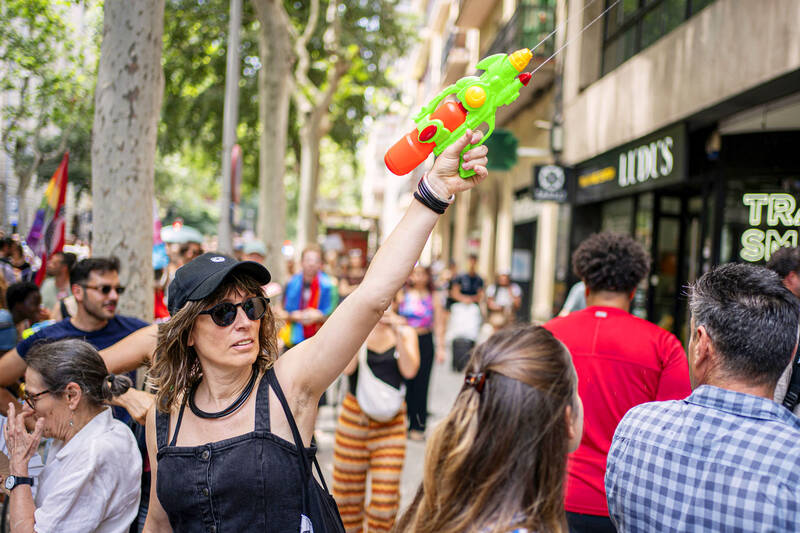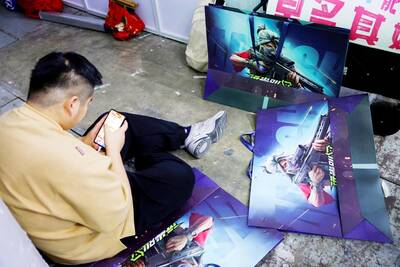A group of tourists were sitting at an outdoor table in the Spanish city of Barcelona, trying to enjoy their drinks, when a woman raised a cheap plastic water gun and shot an arc of water at them.
Her weapon of choice — the cheap, squirt-squirt variety — is an increasingly common fixture at anti-tourism protests in the southern European country, where many locals fear that an overload of visitors is driving them from their cherished neighborhoods.
But how did the humble water gun become a symbol of discontent?

Photo: AP
REFRESHING TO REVOLUTIONARY
The phenomenon started last July, when a fringe, left-wing activist group based in Barcelona that promotes the “degrowth” of the city’s successful tourism sector held its first successful rally. Some brought water guns to shoot one another and stay cool in the summer heat.
“What happened later went viral, but in reality it was just kind of a joke by a group of people who brought water guns because it was hot,” Adriana Coten, one of the organizers of Neighborhood Assembly for Tourism Degrowth, said.
Then, some turned their water guns from each other to tourists. The images went around the world, becoming a publicity coup for the anti-tourism cause.
The guns reappeared in April when the same group stopped a tour bus in Barcelona, the Catalan capital.
GUNS DRAWN
On Sunday, around a thousand people marched from a luxury shopping boulevard popular with affluent foreigners before police stopped them from getting closer to Barcelona’s top sightseeing destination: La Sagrada Familia church.
The marchers spritzed unsuspecting tourists along the way, chanting slogans and carrying protest signs. One read: “One more tourist, one less resident!”
They left a trail of stickers on hotel doors, lampposts and outdoor cafe tables showing a squirting water gun encircled by a message in English: “Tourist Go Home!”
Still, the number of Barcelona protesters carrying water guns was a minority — and in the gun-toting group, many were only shooting in the air or at each other. One dad was toting his baby in a front-pack, water gun in hand.
Outside the protests, Barcelona locals are not toting water guns or taking aim at tourists. And many in the city still support tourism, which is a pillar of the local economy.
A SYMBOL
Can the water gun really change the minds of tourists, authorities or the businesses that drive the industry? Depends on who you ask.
Protester Lourdes Sanchez and her teenage daughter, each holding a water gun, said the gun “really isn’t to hurt anyone.”
“This is a symbol to say that we are fed up of how [the] tourism industry is transforming our country into a theme park,” Sanchez said.
Another demonstrator, Andreu Martinez, acknowledged it was “to bother the tourists a bit.”
Laurens Schocher, a 46-year-old architect, said he didn’t shoot any suspected tourists but hoped that carrying a water gun would bring more attention to their cause.
“I don’t think the tourists will get it,” he said. “I think this is to send a message to [the] authorities.”
The marchers had no monster, pump-action water cannons most kids use for backyard battles in the summer. Theirs were the old-school, cheap-o water guns that send a slim jet of w ater not that far away.
Some tourists who were sprayed took it in stride, even claiming it was refreshing on a day with temperatures pushing up to around 30 degrees Celsius.
But there were moments of tension. When several marchers squirted workers at a large hostel, tempers flared and one worker spat at his attackers as he slammed the hostel door shut.
Nora Tsai, who had just arrived from Taiwan on a short visit, was among those spritzed on Sunday. She said she was a bit frightened and saddened. The “Tourist go home!” chants didn’t help either.
“I still like Barcelona,” she said. “I have met a lot of people who were kind.”

During the Metal Ages, prior to the arrival of the Dutch and Chinese, a great shift took place in indigenous material culture. Glass and agate beads, introduced after 400BC, completely replaced Taiwanese nephrite (jade) as the ornamental materials of choice, anthropologist Liu Jiun-Yu (劉俊昱) of the University of Washington wrote in a 2023 article. He added of the island’s modern indigenous peoples: “They are the descendants of prehistoric Formosans but have no nephrite-using cultures.” Moderns squint at that dynamic era of trade and cultural change through the mutually supporting lenses of later settler-colonialism and imperial power, which treated the indigenous as

By 1971, heroin and opium use among US troops fighting in Vietnam had reached epidemic proportions, with 42 percent of American servicemen saying they’d tried opioids at least once and around 20 percent claiming some level of addiction, according to the US Department of Defense. Though heroin use by US troops has been little discussed in the context of Taiwan, these and other drugs — produced in part by rogue Chinese Nationalist Party (KMT) armies then in Thailand and Myanmar — also spread to US military bases on the island, where soldiers were often stoned or high. American military policeman

An attempt to promote friendship between Japan and countries in Africa has transformed into a xenophobic row about migration after inaccurate media reports suggested the scheme would lead to a “flood of immigrants.” The controversy erupted after the Japan International Cooperation Agency, or JICA, said this month it had designated four Japanese cities as “Africa hometowns” for partner countries in Africa: Mozambique, Nigeria, Ghana and Tanzania. The program, announced at the end of an international conference on African development in Yokohama, will involve personnel exchanges and events to foster closer ties between the four regional Japanese cities — Imabari, Kisarazu, Sanjo and

A town in Japan is to urge all residents to restrict their smartphone use to two hours a day in an attempt to tackle online addiction and sleep deprivation. Officials in Toyoake, Aichi prefecture, said the measure would target not only children but also adults, amid growing concern about the physical and psychological toll excessive smartphone use is taking on people of all ages. The move aims “to prevent excessive use of devices causing physical and mental health issues … including sleep problems,” the mayor, Masafumi Koki said recently. The Toyoake municipal assembly began debating the non-binding ordinance this week ahead of a